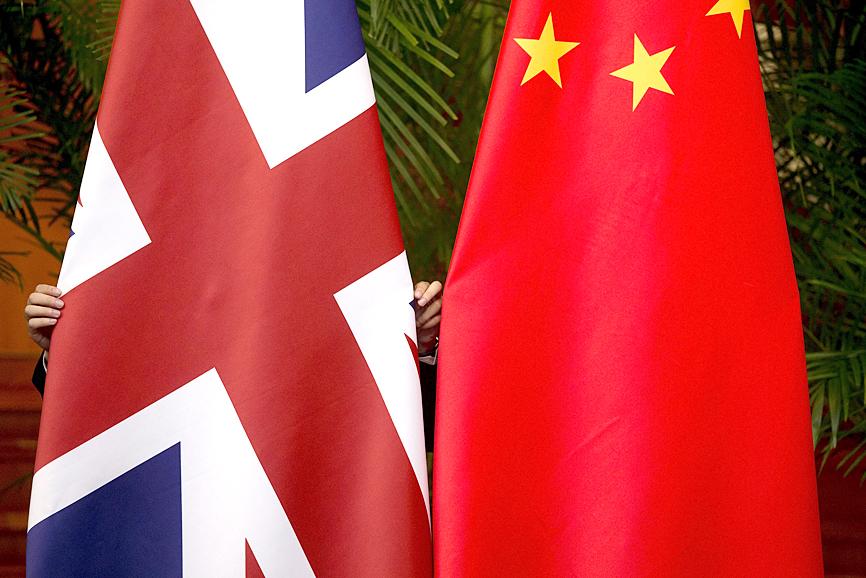A two-year-old Shanghai-based developer of chip design software was behind an attempt to buy a British firm, a purchase that regulators blocked with little explanation in the latest example of Britain’s increasing hostility toward Chinese investment.
Super Orange HK Holding Ltd (香港超橙控股有限公司) was blocked from buying Bristol-based chip design software provider Pulsic Ltd, British Secretary of State for Business, Energy and Industrial Strategy Kwasi Kwarteng said in a brief statement on Wednesday.
However, Super Orange is controlled by little-known Shanghai UniVista Industrial Software Group (上海合見工業軟件集團), according to Hong Kong public filings and Chinese corporate data.

Photo: Reuters
The Shanghai firm is backed by the National Integrated Circuit Industry Investment Fund (國家集成電路產業投資基金) — a powerful US$50 billion state-backed vehicle known within the industry as the “Big Fund” (大基金).
It is unclear what roles Super Orange’s controlling shareholders played in the takeover attempt. Pulsic’s would-be acquirer was founded in Hong Kong in August last year by Nanjing Puxin Software, according to local filings.
That firm is wholly owned by UniVista, according to Chinese corporate database Tianyancha.
UniVista was incorporated only in 2020 and describes itself as a provider of electronic design automation (EDA) tools to the chip industry, or software kits vital to the design of semiconductors. Its No. 2 owner was the Big Fund, which typically bankrolls promising start-ups in their initial stages, according to Tianyancha.
Little is known about Puxin, the UniVista subsidiary that directly controls Super Orange. The office number listed in Puxin’s legal documents did not exist when Bloomberg News visited the Nanjing campus listed on Thursday. Several employees at the business park said the address does not conform with the usual format within the location.
The US has been leaning on allies from the UK to Japan to join in efforts to block China’s chip goals. Pulsic is also a player in EDA tools, employed by leading chipmakers ranging from Taiwan Semiconductor Manufacturing Co (台積電) to Intel Corp.
Beijing considers the sector, dominated by American firms Synopsys Inc and Cadence Design Systems Inc, a key bottleneck in its ambitions to build a world-class semiconductor industry and wean China off US technology.
Pulsic’s would-be acquirer — Super Orange HK Holding — had a sole and founding director identified as Zhou Nuo. He ceded his post in December to Xu Yun (徐昀), Hong Kong filings showed. Xu, the former head of Cadence’s Chinese business, is now a co-CEO at UniVista.
Xu, once named one of China’s most influential female chip executives, was also a director of the similarly named Super Orange HK Ltd, a separate entity founded in March that is wholly owned by Shanghai UniVista Technology. Her co-CEO is Pan Jianyue (潘建岳), who headed Synopsys Inc’s China and Asia-Pacific business before the pair founded the other UniVista Industrial last year.
Xu and Pan said in an interview in November last year that they harbor ambitions to not just replace US technology, but build a globe-spanning operation that can go toe-to-toe with the industry’s leaders.

SECURITY: As China is ‘reshaping’ Hong Kong’s population, Taiwan must raise the eligibility threshold for applications from Hong Kongers, Chiu Chui-cheng said When Hong Kong and Macau citizens apply for residency in Taiwan, it would be under a new category that includes a “national security observation period,” Mainland Affairs Council (MAC) Minister Chiu Chui-cheng (邱垂正) said yesterday. President William Lai (賴清德) on March 13 announced 17 strategies to counter China’s aggression toward Taiwan, including incorporating national security considerations into the review process for residency applications from Hong Kong and Macau citizens. The situation in Hong Kong is constantly changing, Chiu said to media yesterday on the sidelines of the Taipei Technology Run hosted by the Taipei Neihu Technology Park Development Association. With

CARROT AND STICK: While unrelenting in its military threats, China attracted nearly 40,000 Taiwanese to over 400 business events last year Nearly 40,000 Taiwanese last year joined industry events in China, such as conferences and trade fairs, supported by the Chinese government, a study showed yesterday, as Beijing ramps up a charm offensive toward Taipei alongside military pressure. China has long taken a carrot-and-stick approach to Taiwan, threatening it with the prospect of military action while reaching out to those it believes are amenable to Beijing’s point of view. Taiwanese security officials are wary of what they see as Beijing’s influence campaigns to sway public opinion after Taipei and Beijing gradually resumed travel links halted by the COVID-19 pandemic, but the scale of

A US Marine Corps regiment equipped with Naval Strike Missiles (NSM) is set to participate in the upcoming Balikatan 25 exercise in the Luzon Strait, marking the system’s first-ever deployment in the Philippines. US and Philippine officials have separately confirmed that the Navy Marine Expeditionary Ship Interdiction System (NMESIS) — the mobile launch platform for the Naval Strike Missile — would take part in the joint exercise. The missiles are being deployed to “a strategic first island chain chokepoint” in the waters between Taiwan proper and the Philippines, US-based Naval News reported. “The Luzon Strait and Bashi Channel represent a critical access

Pope Francis is be laid to rest on Saturday after lying in state for three days in St Peter’s Basilica, where the faithful are expected to flock to pay their respects to history’s first Latin American pontiff. The cardinals met yesterday in the Vatican’s synod hall to chart the next steps before a conclave begins to choose Francis’ successor, as condolences poured in from around the world. According to current norms, the conclave must begin between May 5 and 10. The cardinals set the funeral for Saturday at 10am in St Peter’s Square, to be celebrated by the dean of the College